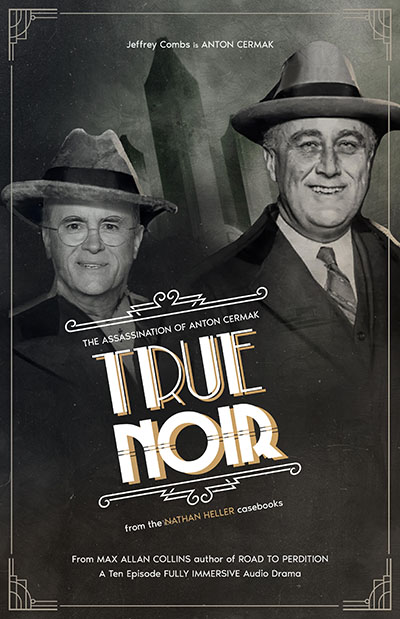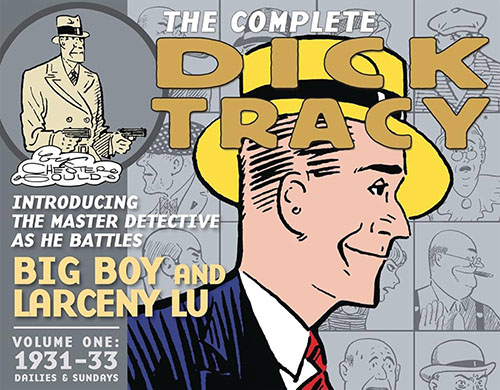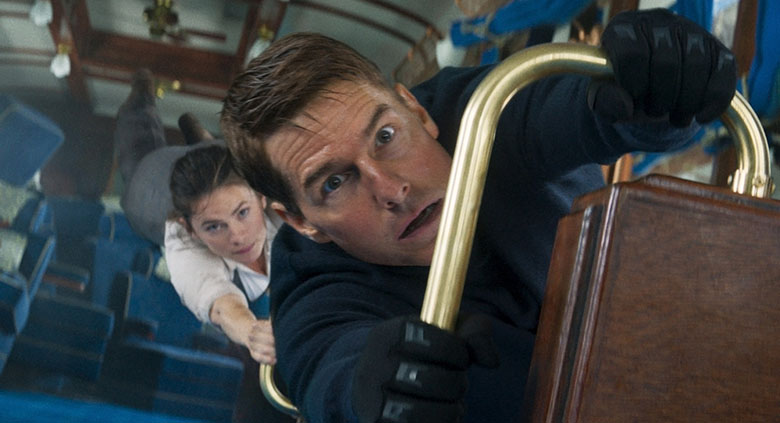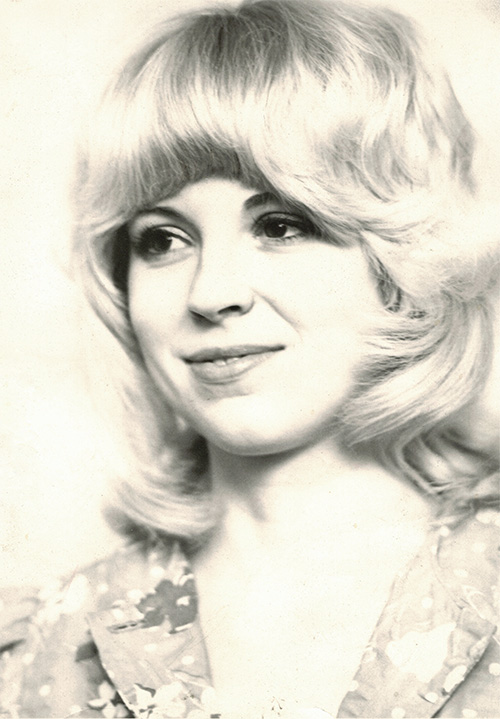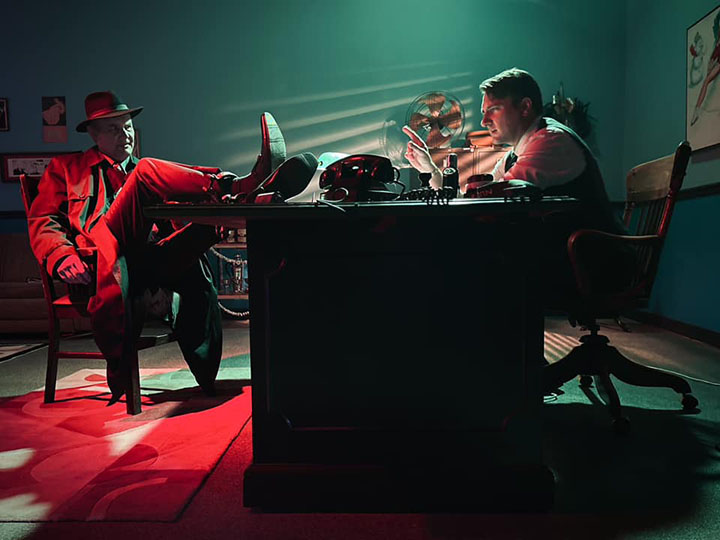
Jake Marley (Chris Causey) and Richard Stone (Rob Merritt) in the private eye’s office.
We completed production on Blue Christmas last evening, and will be picking up various things and stuff at Muscatine Community College (our gracious host) this afternoon. Before I discuss the shoot, let me provide some background, requesting patience from those of you who have heard this story before (perhaps more than once).
The day before Thanksgiving 1992, I was notified by mail in a letter from a particularly odious editor at Tribune Media Services that my services as writer of the Dick Tracy strip were no longer required. I had done the writing of the strip, taking over for creator Chester Gould, since late 1977 – a fifteen-year run plus a few months.
Actually, they had already picked up my contract by not notifying me into I was three months into the new contract period, which was an automatic pick-up. But when I called the gracious Robert Reed, the recently retired head of the TMS, he talked me out of suing the Trib. He had hired me, and he deplored the decision of the editor (who had not hired me), but reminded me how many lawyers the Trib had, and how costly it would be for me to fight a battle even in the right. Then he said something I will always appreciate him for.
“You don’t need to worry about your next job,” he said. “You’re Max Allan Collins.”
I had needed reminding on that point. My friend and future DC Comics editor, Mike Gold, had already told me, “You really should have moved on after ten years. It stopped serving your career at that point.”
Nonetheless, it was a blow. And the same day, my agent informed me that – just a few weeks after winning the Best Novel Shamus award for Stolen Away – my Nate Heller contract had been dropped by Bantam Books, who had screwed up the series by publishing the hardcover and trade edition simultaneously, and making my hardcover sales on that title look like shit in the computers.
So I had lost everything, career-wise – both Tracy and Heller. I scrambled and did a few short stories for my pals Ed Gorman and Marty Greenberg, God bless their memories, but mostly I was at a loss. Untethered. And as close to a writing block as I had ever got. Thanks to Ed and Marty I kept going. But other than those assignments (writing for their theme anthologies), I had hit the wall.
Then on Christmas Eve 1992, after the festivities were over (my family has always celebrated Christmas Eve, rather than Christmas Day), I had an idea and began to write. A Christmas Carol was one of my favorite stories, the Alistair Sim film of it in particular, and my favorite single detective novel was The Maltese Falcon. I had the stray thought that the two stories might be effectively combined, and began to type. I have no idea how long I worked – most of the night, as it was a single session – but the result was a fifty-page novella, “A Wreath for Marley.”
I am not by inclination a short story writer, but as soon as I’d finished it, I knew “Marley” was special. Maybe not to anybody else, but to me. And over the years it’s been in several anthologies and ultimately the lead story in a holiday-themed collection of my shorter stories, Blue Christmas (available from Wolfpack in the collection’s most current incarnation).
The writing of “Marley” ended my creative logjam. Soon I had sold Carnal Hours, one of the best Heller novels, to Dutton in a multiple-book contract; and – on the fly, at WonderCon – sold the idea of Road to Perdition to a DC editor who wondered if I might be interested in writing a noir graphic novel. Mike Gold and Robert Reed had been right – losing Dick Tracy was like Dean Martin breaking up with Jerry Lewis – teaming with Jerry was the best thing that ever happened to Dino (Martin said) and the next best thing had been breaking up with Jerry.
Another result of losing the Tracy strip was finally pursuing my interest in filmmaking. In 1994 I wrote The Expert in Hollywood for director William Lustig, and wrote and directed Mommy here in Iowa. The latter feature – in which Patty McCormack portrayed a grown-up variation on her famous evil kid role in The Bad Seed – became a video store hit and sold to Lifetime as a movie of the week. Its success led to my scripting a feature film version of “A Wreath for Marley,” which I called Blue Christmas. We were in pre-production of that project when the success of Mommy made it necessary to follow up with a sequel, Mommy’s Day, causing us to temporarily shelve Blue Christmas. The thought was to do it next.
That did not happen. While Mommy’s Day was also a video store hit, we did not get a cable TV sale, and then my producer – only my best friend from high school days and the best man at Barb and my wedding – stole our money. I was never able to mount a full-throated production again. Our budgets of half a million and a quarter million for Mommy 1 and 2 respectively were never to be repeated.
I managed to stay active in indie filmmaking for another decade. I served three terms as president of the Iowa Motion Picture Association. I was able to get funded for two documentaries (Mike Hammer’s Mickey Spillane and Caveman: V.T. Hamlin and Alley Oop) and did three short films with my Mommy director of photography, Phil Dingeldein. Phil and I mounted Real Time: Siege at Lucas Street Market for around $10,000 (shooting mostly on security cameras) and had a similar budget (thanks to a Humanities Iowa grant) with Eliot Ness: An Untouchable Life. I wrote numerous screenplays and sold a few, including some that were never produced, with a short Quarry film, “A Matter of Principal” leading to the feature The Last Lullaby, which I co-wrote.
Then, of course, there was Road to Perdition with its big-name cast and Academy Award nominations and so on, which led to Phil and me trying to get the sequel, Road to Purgatory, off the ground. Much time was spent on that and we came heart-breakingly close several times. While various screenwriting projects continued (and still do), gradually I came to accept that my film directing days were over.
I did not consider this a tragedy as my fiction writing was trucking along. A Quarry TV series was produced by HBO for their Cinemax network and I was able to do a couple of scripts for it (one for the never-produced second season). Filmmaking was a part of my credentials and that was nice but nothing I was actively pursuing any longer.
Then last year I co-produced the “Mike Hammer” Golden Age Radio-style play, Encore for Murder, originally an audio full-cast production with Stacy Keach. I had done the play twice before (in Owensboro, Kentucky, and Clearwater, Florida) with Gary Sandy as Hammer. Gary and I were friends going back to his co-starring role in Mommy’s Day. This latest Encore production was a fundraiser for the local art center/museum, and Gary generously donated his time.
The play came together so well that literally a few days before its single performance, I called Phil Dingeldein and asked, “Do you want to make a movie this weekend?”
As some of you already know, Phil came down and he and Chad Bishop (who was the on-stage foley guy in the play) pooled their resources to shoot two dress rehearsals and our one performance. Then Chad and I spent a month or so editing the footage into a movie of sorts – or maybe it’s a television program, hard to say exactly what animal it is.
At any rate, the result, like the performance itself, was surprisingly good. Phil and I were already mounting an expanded version of the Spillane documentary as a 75th anniversary (of Mike Hammer) release for VCI. We showed Encore for Murder to Bob Blair, the president of VCI, pitching it as a Blu-ray bonus feature for the expanded documentary. Bob not only snatched it right up for that purpose, he planned a release on DVD of Encore itself. Both will be out well before year’s end.
So my filmmaking juices were flowing again. I proposed to Chad Bishop that we mount a follow-up Golden Age radio-style production of Blue Christmas. This morphed into a stage play that I planned to shoot much as we had Encore, only with more elaborate pre-production.
Finally I decided just to shoot it as a movie.
The script needed to be reworked from one that had half a dozen locations to one location in which all the the Scrooge-like visions take place in the private eye hero’s office – a single realistic set that would serve surrealistic purposes.
Phil came on board, taking a week’s vacation to shoot it (with his sometime accomplice, the talented and skilled Liz Toal), meaning we had to mount the principal photography in a single week. I approached Muscatine Community College about using their black box theater as, essentially, a film sound stage for the week-long shoot, and they got on board.
We had been led to believe we had a good shot at a Greenlight Iowa grant for $50,000, which would have been tight but sufficient. We mounted an Indie Go Go campaign to raise supplemental funding and reached our $7000 goal. But the grant did not come to us – although frankly we were never contacted about that after jumping through many an official hoop (never even informed we weren’t getting it, which stalled us while we waited for news that never arrived).
So finally we built upon the Indie Go Go money, took our own payment completely out of the budget (Chad, Phil and me), and got one $5000 investor and a few more donations, coming up with a princely $14,000 to produce the equivalent of a $300,000 to $500,000 indie. This was a big part of planning to do the film in (choke) six days.
For a long time, Gary Sandy was going to play Marley, but other commitments and a reluctance to work during the actor’s strike (although our micro-budgeted production was not a target of the strike) caused Gary to drop out a few weeks before shooting began. That left us with a cast consisting of talent from the Quad Cities, Cedar Rapids and Muscatine, with almost everyone from Encore for Murder back again.
So how did the shoot go?
The professionalism of Phil and Liz was a breathtaking thing to watch. Chad Bishop wore more hats than Barthlomew Cubbins – lighting, audio, producer, actor. I had caught Covid about a month out and got cleared to work weeks before the production would begin; so I was tired and exhausted going in…but that didn’t stop me. I would say I got my stride back by the second or at the latest third day.

Barb and Max on set at Blue Christmas.
Our set was a thing of beauty thanks to Bill Turner, a veteran of local theater; and Bill took on a role in the production as well, doing a fine job. Our lead was the remarkable Rob Merritt from Cedar Rapids, who has many movie roles under his belt and held up under the burden of being in virtually every scene. Among his co-stars was national celebrity Alisabeth Von Presley, who looks like something out of a Russ Meyer dream and performed like a dream, period. The entire cast did stellar work, including Encore veterans Chris Causey, Rene Mauck, Cassidy Probasco, Brian Linderman, Keith Porter, Judy Wilson, and Evan Maynard. Tommy Ratkiewicz-Stierwalt, Chase Bishop, Kim Furness, Dave Juehring, Tracy Pelzer-Timm and Scot Gehre, among others, were also in a very talented cast of twenty-four. Corey Ruby did the special effects, and my old Seduction of the Innocent pal Chris Christensen has signed on to do the score.
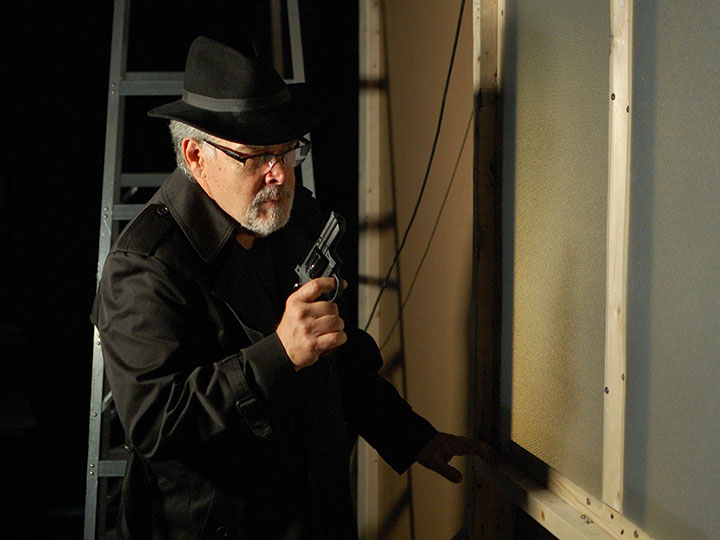
Director of Photography Phil Dingeldein gets a role…
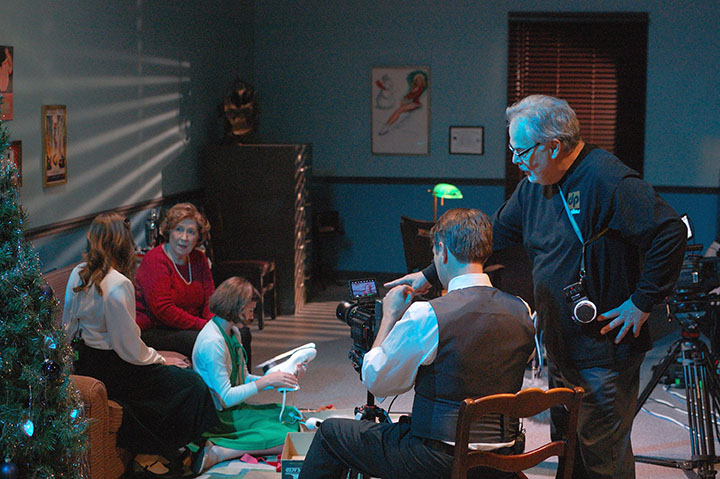
…and lead actor Rob Merritt films a scene.
We worked long days – seven a.m. till at least seven p.m. On all but one day, I went home on the lunch hour and took a nap. The production was both brutal and rewarding, and it’s doubtful I’ll ever be foolish enough to put myself through something like this again…although I’m glad to have done this one last time.
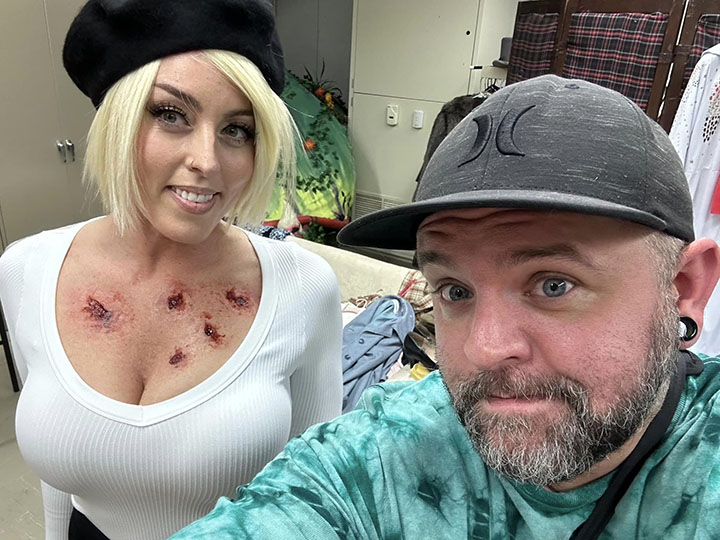
Special effects man Corey Ruby takes pride in applying bullet holes to lovely Alisabeth Von Presley.
Barb had sworn not to be part of this crazy effort, but she was right there with me on the first day and thereafter. She ran craft services and did so very much more. Nathan Collins and Matt Clemens were there every day running security (MCC was in session). Nate did everything from man a boom pole to shoot footage on a high-end camera.
Of course, we’re not finished. Chad and I (and Chad’s cohort Jeremy Ferguson) will be shooting Second Unit material, chiefly establishing shots (once the snow starts to fall here). And right away we will begin editing, a process I enjoy a great deal.
I will report here as we move forward, but I can say that at long last, the promise of Blue Christmas is being fulfilled. If we’re not the best goddamn fourteen-thousand dollar movie ever made, I defy you to show me one that is.
* * *
Despite some stellar reviews on Amazon, Too Many Bullets remains mostly ignored by critics elsewhere. As I mentioned previously, none of the trades – Publisher’s Weekly, Kirkus, Library Journal or Booklist – had reviewed it.
I am going to get the book into some reviewers’ hands, but in the meantime, if you’ve read and enjoyed the novel, please review it at Amazon, Barnes and Noble, Goodreads and elsewhere, and if you have your own blog, talk it up there.
There have been a few notices, like this one.
And this.
M.A.C.
